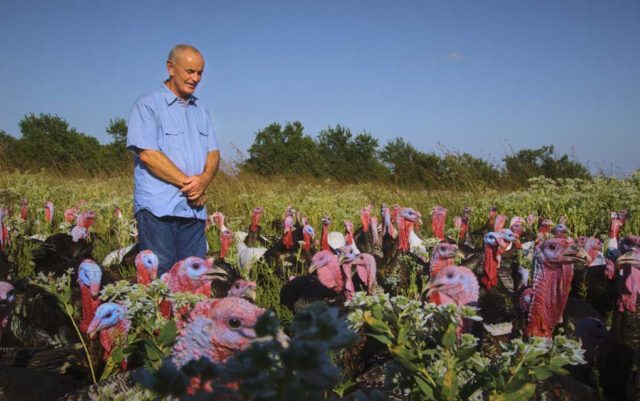
Eating Animals is not out to tell you to become a vegetarian. Instead, the new documentary, directed by Christopher Quinn and produced by Natalie Portman and Jonathan Safran Foer, aims to illuminate the truth of the meat industry and contemplate how factory farming became what it is today.
What you do with that information, Quinn says, is up to you.
“What I didn’t want to do was to wag a finger at anybody,” the director says. “Those films are out there, and you can find a vegan abolitionist film and you can find a pro-meat film. What I wanted to do was present the evidence and, after somebody watches the film, be able to have a conversation… I’m a big believer in filmmaking to be able to give somebody the space to intellectually think on their own.”
Based on Foer’s 2009 book of the same name, Eating Animals traces the rise of mass-produced meat by Big Agriculture and corporate farming. But unlike most pro-vegetarian/vegan films, the documentary starkly contrasts the horrors of large-scale factory farming with localized farmers who possess a deep love for their animals and their craft.
“Ninety-nine percent of our meat comes from factory farms,” Quinn says. “There was something appealing about taking a look at the 1 percent that still survives… We have to see what we’re giving up with the cost-efficient system of industrialized agriculture.”
The narrative-based documentary puts the spotlight on the other “1 percent” by exploring the stories of farmers, activists and whistleblowers who speak out against the industry’s mistreatment of poultry and livestock. By centering the narrative on those who are keeping traditional farming alive, the film displays just how much we are giving up to keep cheap meat in our diets.
“Parts of the movie are joyful and happy,” says Frank Reese, a fourth-generation Kansas poultry farmer featured in the film. “I think the scenes of me and the turkeys in the field show you what can be. Then there are parts of the movie that I can’t watch.”
In the production process, Quinn had no shortage of confrontation with those he calls the agriculture corporation managers (“I don’t know if you could even call them farmers anymore,” he says). But within the secrecy, surveillance and policies like “ag gags” that make filming in certain locations illegal, Quinn senses that the industrial farming companies know their practices are immoral.
“There’s something really interesting about the fact that they know something’s wrong, and in that there’s some sort of hope,” Quinn says. “They’re very aware that this is something not for people to see.”
The film also seeks to destroy common misconceptions about purchasing meat labeled as “cage-free.” While the animals may not literally be in cages, warehouses can keep thousands of birds in a dark space, never to see the light of day and prone to diseases and parasites.
“We have become a huge monoculture,” Reese says. “I don’t care if it’s free range, organic, all natural, amish-raised, fast-growth, slow-growth, whatever fancy name Whole Foods wants to give it — it’s still the same chicken. There’s no diversity. We’re down to two companies worldwide that control all the chicken.”
The key to buying ethical poultry, Reese says, is to look for the American Poultry Association’s stamp of approval on the packaging.
In a particularly beautiful shot, with a golden sun setting over his Kansas farm, Reese walks among his turkeys. “I find my faith in doing what I do and the connection with the earth and these animals is a very religious experience,” he says in voiceover. “Holiness doesn’t mean you do great things, it means you do small things with great love.”
In avoiding an antagonistic approach to conveying the message, Quinn hopes to encourage consciousness when it comes to how we think about our food, no matter whether we label ourselves vegans, vegetarians or carnivores. After all, the vast majority of people who eat meat don’t want the animal to suffer. So if audiences can start a dialogue about what they are putting on their plates, Quinn says the film will be a success.
“The nice thing about [changing the meat industry] is that it’s not going to take billions of dollars and it’s not going to take overthrowing the government,” he says. “It’s not going to take a war. It’s really just about making a decision. There’s something very important about the idea that once you know that you have this opportunity, you can really make a powerful choice.”
On the Bill: Eating Animals. Various times at Cinebarre Boulder 11, 1164 Dillon Road, Louisville; and Landmark Mayan Theatre, 110 Broadway, Denver. Opens July 6.














